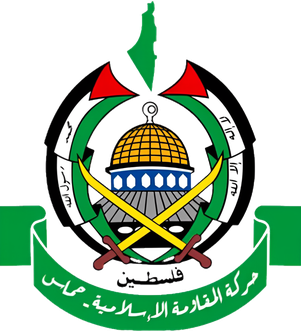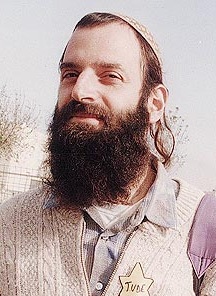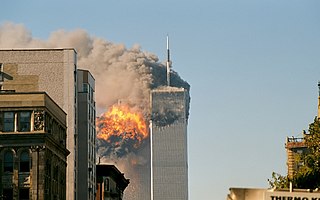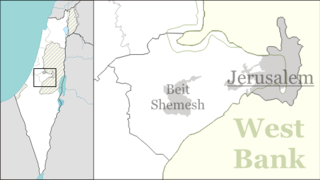Terrorism in Israel may refer to:
Terrorism in Israel may refer to:

Hamas, an acronym of its official name, Harakat al-Muqawama al-Islamiya, is a Palestinian Sunni Islamist political and military movement governing parts of the occupied Gaza Strip.

Zionist political violence refers to politically motivated violence or terrorism perpetrated by Zionists. The term is used to describe violence committed by those who support the political movement of Zionism, and violence committed against opponents of Zionism. The violence often takes the form of terrorist attacks and has been directed against both Jewish and Arab targets. The most active period of most notable Zionist political violence began on June 30, 1924, through the 1940s, and continues to the present day, usually for the purpose of expanding Zionist settlements in Mandatory Palestine.

Baruch Kopel Goldstein was an American-Israeli mass murderer, religious extremist, and physician who perpetrated the 1994 Cave of the Patriarchs massacre in Hebron in the Israeli-occupied West Bank, an incident of Jewish terrorism. Goldstein was a supporter of the Kach, a religious Zionist party that the United States, the European Union and other countries designate as a terrorist organization.

The Second Intifada, also known as the Al-Aqsa Intifada, was a major uprising by Palestinians against the Israeli occupation, characterized by a period of heightened violence in the Palestinian territories and Israel between 2000 and 2005. The general triggers for the unrest are speculated to have been centered on the failure of the 2000 Camp David Summit, which was expected to reach a final agreement on the Israeli–Palestinian peace process in July 2000. An uptick in violent incidents started in September 2000, after Israeli politician Ariel Sharon made a provocative visit to the Al-Aqsa compound, which is situated atop the Temple Mount in East Jerusalem; the visit itself was peaceful, but, as anticipated, sparked protests and riots that Israeli police put down with rubber bullets, live ammunition, and tear gas. Within the first few days of the uprising, the IDF had fired one million rounds of ammunition.

The roadmap for peace or road map for peace was a plan to resolve the Israeli–Palestinian conflict proposed by the Quartet on the Middle East: the United States, the European Union, Russia and the United Nations. The principles of the plan, originally drafted by U.S. Foreign Service Officer Donald Blome, were first outlined by U.S. President George W. Bush in a speech on 24 June 2002, in which he called for an independent Palestinian state living side by side with Israel in peace. A draft version from the Bush administration was published as early as 14 November 2002. The final text was released on 30 April 2003. The process reached a deadlock early in phase I and the plan was never implemented.
The Letters of Mutual Recognition were exchanged between Israel and the Palestine Liberation Organization on 9 September 1993. In their correspondence, Israeli prime minister Yitzhak Rabin and Palestinian political leader Yasser Arafat agreed to begin cooperating towards a peaceful solution to the Israeli–Palestinian conflict. The PLO recognized Israel's right to exist in peace, renounced Palestinian militancy and terrorism, and accepted UNSC Resolution 242 and UNSC Resolution 338. Israel recognized the PLO as a legitimate authority representing the Palestinian people and agreed to commence comprehensive negotiations for the Israeli–Palestinian peace process. These initial agreements between Rabin and Arafat laid the groundwork for the Oslo I Accord on 13 September 1993, effectively serving as its preamble.

Palestinian political violence refers to actions carried out by Palestinians with the intent to achieve political objectives that can involve the use of force, some of which are considered acts of terror, and often carried out in the context of the Israeli–Palestinian conflict. Common objectives of political violence by Palestinian nationalists include self-determination in and sovereignty over Palestine, or the "liberation of Palestine" and recognition of a Palestinian state, either in place of both Israel and the Palestinian territories, or solely in the Palestinian territories. Some perpetrators of these acts support the dismantling of the State of Israel and its replacement with a Palestinian Arab state. More limited goals include the release of Palestinian prisoners or the Palestinian right of return. Other motivations include personal grievances, trauma or revenge.

On 1 June 2001, a Hamas-affiliated Islamist terrorist blew himself up outside the Dolphinarium discotheque on the beachfront in Tel Aviv, Israel, killing 21 Israelis, 16 of whom were teenagers. The majority of the victims were Israeli teenage girls whose families had recently immigrated from the former Soviet Union.
Jewish extremist terrorism is terrorism, including religious terrorism, committed by extremists within Judaism.

Itamar is an Israeli settlement located in the West Bank's Samarian mountains, five kilometers southeast of the Palestinian city of Nablus. The settlement was built on land confiscated from the Palestinian villages of Awarta, Beit Furik,Yanun, Aqraba and Rujeib. The predominantly Orthodox Jewish community falls in part within the municipal jurisdiction of the Shomron Regional Council. Under the terms of the Oslo Accords of 1993 between Israel and the Palestine Liberation Organization, Itamar was designated Area "C", under provisional Israeli civil and security control, before a transition period after which Area "C" was to be handed back to the Palestinians. In 2022, it had a population of 1,470.

According to the Israel Police, the general crime rate dropped in 2020, while cyber crimes, domestic violence and sexual abuse incidents rose.

Israeli casualties of war, in addition to those of Israel's nine major wars, include 9,745 soldiers and security forces personnel killed in "miscellaneous engagements and terrorist attacks", which includes security forces members killed during military operations, by fighting crime, natural disasters, diseases, traffic or labor accidents and disabled veterans whose disabilities contributed to their deaths. Between 1948 and 1997, 20,093 Israeli soldiers were killed in combat, 75,000 Israelis were wounded, and nearly 100,000 Israelis were considered disabled army veterans. On the other hand, in 2010 Yom Hazikaron, Israel honored the memory of 22,684 Israeli soldiers and pre-Israeli Palestinian Jews killed since 1860 in the line of duty for the independence, preservation and protection of the nation, and 3,971 civilian terror victims. The memorial roll, in addition to IDF members deceased, also include fallen members of the Shin Bet security service, the Mossad intelligence service, the Israel Police, the Border Police, the Israel Prisons Service, other Israeli security forces, the pre-state Jewish underground, and the Jewish Brigade and the Jewish Legion.

A suicide attack is a deliberate attack in which the perpetrators knowingly sacrifice their own lives as part of the attack. These attacks are often associated with terrorism or military conflicts and are considered a form of murder–suicide. Suicide attacks involving explosives are commonly referred to as suicide bombings. In the context of terrorism, they are also commonly referred to as suicide terrorism. While generally not explicitly regulated under international law, many suicide attacks violate international laws of war, such as prohibitions against perfidy or targeting civilians. In 2019, there were 149 suicide bombings in 24 countries, carried out by 236 individuals. These attacks resulted in 1,850 deaths and 3,660 injuries.
Events in the year 2003 in Israel.
The murders of Koby Mandell and Yosef Ishran occurred on 8 May 2001, when two Jewish teenagers, Yaakov "Koby" Mandell and Yosef Ishran, were killed on the outskirts of the Israeli settlement of Tekoa in the West Bank, where they lived with their families. The identity of the killers has never been determined, though Israel and a number of sources state that unidentified Palestinian terrorists were responsible.

A twin suicide bombing of an Egged bus occurred in the French Hill settlement of northern East Jerusalem on 18 May 2003. Seven passengers were killed in the attack, and 20 injured. A few minutes after the first attack, a second suicide bomber blew himself up at the entrance to the village of Dahiya el-Barid, near Jerusalem. Only the bomber was killed in what appeared to be a premature detonation.
The killing of Yehuda Shoham occurred on 5 June 2001 as the result of a stoning attack attributed to Palestinians on a civilian vehicle, from the Israeli settlement of Shilo, in which five-month-old American-Israeli Yehuda Shoham was seated. Rocks crashed through the car's windscreen and crushed the infant's skull. Shoham died of severe brain damage on 11 June 2001.

An increase of violence occurred in the Israeli–Palestinian conflict starting in the autumn of 2015 and lasting into the first half of 2016. It was called the "Intifada of the Individuals" by Israeli sources, the Knife Intifada, Stabbing Intifada or Jerusalem Intifada by international sources because of the many stabbings in Jerusalem, or Habba by Palestinian sources. 38 Israelis and 235 Palestinians were killed in the violence. 558 Israelis and thousands of Palestinians were injured.
Stabbing attacks, which have been used as a terrorist tactic for thousands of years, became an increasingly common form of terrorist attack on random civilians in the 21st century, in particular during the 2010s and 2020s.